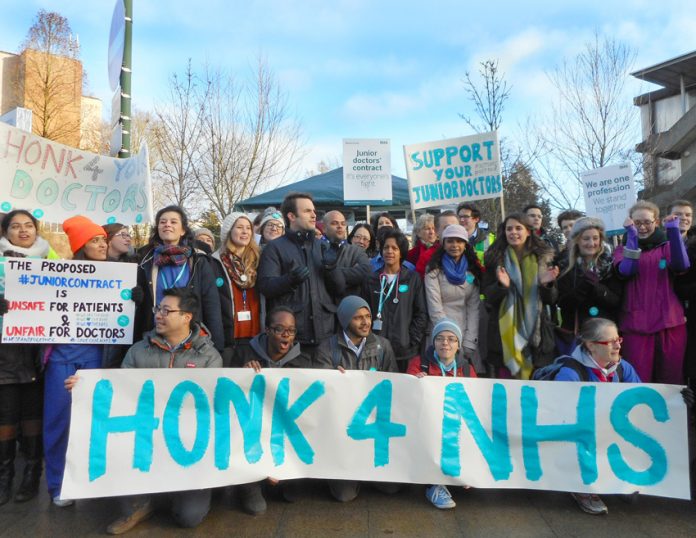470 CANCER doctors have signed a joint statement warning Health Secretary Hunt that the new imposed junior doctors contract ‘will lead to worse outcomes for our cancer patients’ and widen the gap that already exists in cancer survival between the UK and other countries.
The letter, signed by consultants and junior doctors working in oncology, said Hunt’s decision to impose a contract would only damage the recruitment of cancer doctors and do nothing to retain doctors already in the NHS.
It added: ‘Clinical and medical oncologists already offer 24/7 access to acute oncology services. The existing contract is not an obstacle to providing this care. However the increased out-of-hours work will reduce the cancer-specific training that junior doctors will be exposed to leading to less experienced consultants of the future.’
The letter said doctors working in cancer would also receive far less pay for working out-of-hours than at present. It said it was ‘inconceivable’ that the gap between the UK and other countries when it comes to cancer could be closed ‘without an oncology workforce replete with well-trained and enthusiastic specialists’.
A poll of 600 junior doctors and consultants carried out by the Association of Cancer Physicians and the Faculty of Clinical Oncology of the Royal College of Radiologists found 95% agreed the new contract would adversely affect outcomes for cancer patients.
• More than 20,000 NHS shifts a week, filled by agency workers, are in breach of new rules which caps the limit. Nine in ten NHS hospitals are breaching the new limits because they are desperately attempting to plug the gaps caused by the acute crisis over the lack of NHS nurses, doctors and staff.
Donna Kinnair, Director of Nursing, Policy and Practice at the RCN, said: ‘A shortage of full time staff has consequences for patients and hospitals alike – fewer full time staff impacts on the patient experience whilst the cost of agency nurses soars. The only long-term solution to dealing with agency costs is by training more full time nurses so that supply can meet demand.’
The new report shows that in total, 21,277 shifts in the week starting 28 December were filled at rates above capped limits for doctors, nurses, managers and other staff.
They include 7,944 shifts filled by doctors. They include 7,848 shifts filled by nurses, the report from NHS regulators Monitor discloses. 2,500 shifts were filled by administrative staff at rates higher than the official limits.
• One in three GPs predict their practice will close down by 2020 unless the Tories’ seven-day GP surgery plans are scrapped, a survey of GPs, carried out by think-tank Ockham Healthcare has revealed.
In a new paper, the think-tank said that an ‘urgent response’ was needed for the situation and called on the government to abandon its seven-day access plans and begin to listen to GPs.
Survey respondent Dr Tom Evans, a GP in Northamptonshire, said: ‘There are simply not enough GPs for us to take this on right now. Increasing workload and the inability to recruit colleagues meant that I almost had to close the surgery. I am not alone.’
The findings comes amid revelations that tens of thousands of patients have already lost their GP practice to date in 2016, with new reports of closures almost daily.
